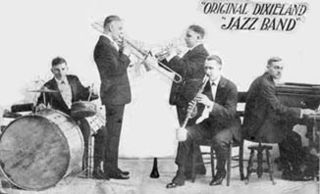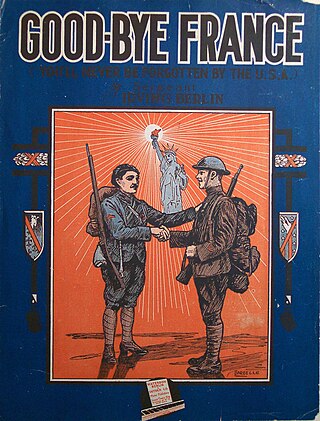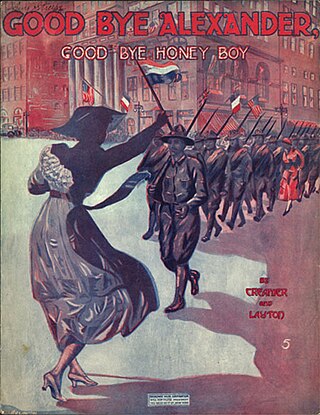
This is a list of notable events in music that took place in the year 1917.

Music hall is a type of British theatrical entertainment that was most popular from the early Victorian era, beginning around 1850, through the Great War. It faded away after 1918 as the halls rebranded their entertainment as variety. Perceptions of a distinction in Britain between bold and scandalous music hall entertainment and subsequent, more respectable variety entertainment differ. Music hall involved a mixture of popular songs, comedy, speciality acts, and variety entertainment. The term is derived from a type of theatre or venue in which such entertainment took place. In North America vaudeville was in some ways analogous to British music hall, featuring rousing songs and comic acts.
Joseph Tabrar was a prolific English writer of popular music hall songs. His song "Daddy Wouldn't Buy Me a Bow Wow" (1892) became Vesta Victoria's first major popular success.

Charles Strouse is an American composer and lyricist best known for writing the music to such Broadway musicals as Bye Bye Birdie, Applause, and Annie.
Goodbye, Good bye, or Good-bye is a parting phrase and may refer to:

Florrie Forde was an Australian-born British vaudevillian performer and popular singer, notable in music hall and pantomime. From 1897 she lived and worked in the United Kingdom, where she found her greatest success, as one of the most popular stars of the early 20th century as a music hall entertainer and recording artist.

"Under the Anheuser Bush" is a beer garden song commissioned by the Anheuser-Busch brewing company in 1903. With music by Harry Von Tilzer and words by Andrew B. Sterling, the title contains a pun on the surnames of the company's founders.
"Toodle-Fucking-Oo" is the sixteenth episode of the HBO original series The Sopranos and the third of the show's second season. It was written by Frank Renzulli, directed by Lee Tamahori, and originally aired on January 30, 2000.
William Herbert Lee was an English songwriter. He wrote for music hall and the musical stage, often in partnership with R. P. Weston.
Robert Patrick Weston was an English songwriter. He was responsible for many successful songs and comic monologues between the 1900s and 1930s, mostly written in collaboration with other writers, notably Fred J. Barnes and Bert Lee, and performed successfully by Harry Champion, Stanley Holloway, and Gracie Fields, among others.

Brooke Allison is the debut studio album by American singer Brooke Allison. Virgin Records released the album on June 19, 2001. Allison worked with producers including Michael Blakey, Robert Palmer, Elton Ahi, Peter Rafelson, Jeff Vincent, Damon Elliott, and Mark Portmann. It is a teen pop album, which was conceived after Allison's songs were discovered by a recording executive online. Brooke Allison's lyrical themes revolve around love and relationships.
"Knees Up Mother Brown" is a pub song, believed to date back as early as the 1800s, but first published in 1938, and with origins in the East End of London.

Woodrow Wilson "Buddy" Johnson was an American jump blues pianist and bandleader active from the 1930s through the 1960s. His songs were often performed by his sister Ella Johnson, most notably "Since I Fell for You", which became a jazz standard.
Charles William Murphy was a prolific British composer of music hall and musical theatre tunes.
"Has Anybody Here Seen Kelly?", with music and lyrics by C. W. Murphy and Will Letters (1908), is a British music hall song, originally titled "Kelly From the Isle of Man". The song concerns a Manx woman looking for her boyfriend during a visit to London. It was adapted for American audiences by William McKenna in 1909 for the musical The Jolly Bachelors. Kelly is the most common surname on the Isle of Man.
Music hall songs were sung in the music halls by a variety of artistes. Most of them were comic in nature. There are a very large number of music hall songs, and most of them have been forgotten. In London, between 1900 and 1910, a single publishing company, Francis, Day and Hunter, published between forty and fifty songs a month.
Frederick Johnson "F.J". Barnes was an English songwriter, who co-wrote numerous songs with R. P. Weston and Fred Godfrey.

Goodbye, France or "Good-bye France " is a World War I era song written and composed by Irving Berlin and published by Waterson, Berlin & Snyder, Inc., in New York City. The sheet music cover, illustrated by Albert Wilfred Barbelle, features French and American soldiers shaking hands with the Statue of Liberty in the background.

"Goodbye Alexander, Goodbye Honey Boy" is a World War I song describing an African American soldier going off to war and his girlfriend's reaction in his military service. The song is credited to Henry Creamer and Turner Layton, the writers of Sweet Emalina, My Gal and After You've Gone.

"Goodbye, Ma! Goodbye, Pa! Goodbye, Mule, with Yer Old Hee-Haw!", also known as "Long Boy", is a World War I era song released in 1917. William Herschel wrote the lyrics. Barclay Walker composed the music. It was published by Shapiro, Bernstein & Co. of New York, New York. Garr Williams designed the sheet music cover. It features a morose-looking cartoon soldier leaving his farm. Farm animals, the soldier's parents, and his girlfriend look on and wave flags. It was written for both voice and piano.










